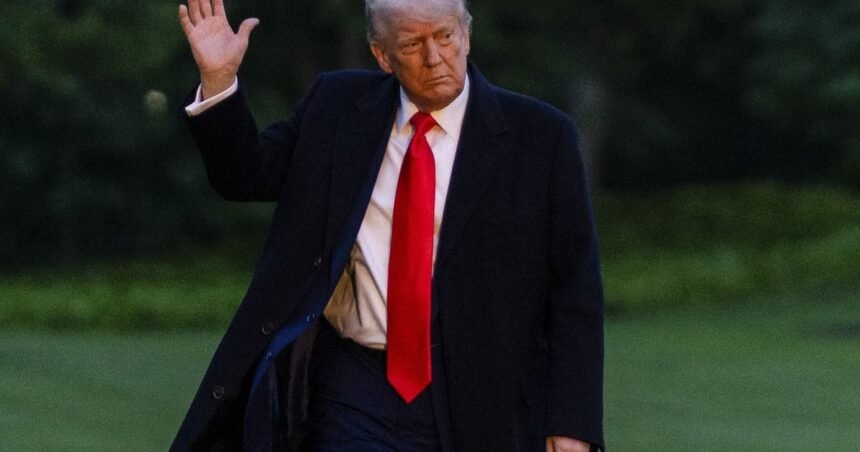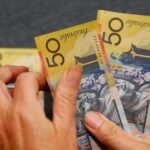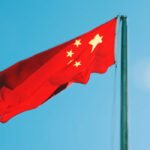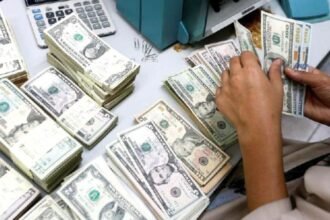Imagine a world without the dollar as the world’s reserve currency.
For more than a century, and especially after the Allied victory in World War II, America has enjoyed the equivalent of a gold card with an unlimited credit line.
Both parties spent decades nurturing the dollar’s dominance.
That’s the benefit of having the currency that’s used by central banks and other monetary authorities around the world for international transactions that drive the global economy.
In addition to American fleets and troops protecting international commerce, oil is monetized in dollars, keeping gasoline relatively inexpensive and plentiful.
The dollar as global reserve currency allows Boeing to easily sell airplanes around the world; the same is true for other Washington companies and farmers.
A weaker dollar, along with tariffs, makes foreign goods more expensive. Any damage to safe-haven status would also raise mortgage rates.
The dollar has long been the top safe-haven currency: One that retains its value no matter the economic climate because of the stability of the United States.
All this is at risk because of President Donald Trump.
According to The Associated Press, the dollar is suffering a concerning fall since Trump unveiled his tariffs — on again, off again — unsettling global trade and undermining confidence in America’s leading role in the world economy. The dollar’s value is down about 10% this year, measured against a basket of other major currencies.
Trump’s unpredictability is unsettling the world. King Charles III said in Ottawa, Canada’s capital, this week,” “We must face reality: since the Second World War, our world has never been more dangerous and unstable.”
Canada, like China, is among Washington’s major trading partners, and is the target of Trump threats — not only levies, ultimately paid by businesses and individuals, but making our northern neighbor America’s 51st state.
Costco buyers can expect to pay more from Trump’s “reciprocal tariffs” on more than 180 nations. Business Insider reports that customers are “stocking up on essentials before some tariffs take effect following a 90-day pause” on enacting the levies. The same is true for Amazon customers.
“Global trust and reliance on the dollar (were) built up over a half century or more,” University of California, Berkeley, economist Barry Eichengreen said, according to The Associated Press. “But it can be lost in the blink of an eye.”
“The safe haven properties of the dollar are being eroded,” Deutsche Bank said in a note to clients earlier this month warning of a ‘confidence crisis.’ ”
A more circumspect report by Capital Economics, an independent provider of economic data, stated, “It is no longer hyperbole to say that the dollar’s reserve status and broader dominant role is at least somewhat in question.”
To be sure, a weaker dollar makes American exports more competitive, but not when it comes so fast. Trump is obsessed with America’s high trade deficit, apparently longing for the 1950s and 1960s of his youth. But U.S. companies’ outsourcing of much manufacturing to Asia gives American customers relatively inexpensive products and, for decades, low inflation in return.
This devil’s bargain was partly driven by high American consumption, financialization of the economy at the expense of manufacturing here, industry consolidation, lax antitrust enforcement and a geostrategic desire to build relations with such nations as China, Japan and Vietnam.
Yet America has run a trade deficit since at least 1975, with only brief exceptions.
Most economists see deficits as a sign of strength. For example, Boston University’s Tarek Alexander Hassan recently argued that, “far from a national emergency, this persistent deficit is actually a sign of America’s financial and technological dominance.”
In the Financial Times, Martin Wolf rightly wrote: “Trump insists that ‘losing the dollar as the world currency … would be the equivalent to losing a war.’ Yet he himself could be the cause of such a loss.”
Wolf continued, “Now, under Trump, the U.S. has become erratic, indifferent, and even hostile: Why would one trust a country that launched a trade war on its allies?”
The U.S. House, led by far-right Republicans — far from the party of Lincoln, Theodore Roosevelt, Dwight Eisenhower, Barry Goldwater or Ronald Reagan — recently passed Trump’s “big beautiful” tax and immigration bill. The multitrillion-dollar tax cuts, primarily for the wealthy, risk raising the national debt to historic levels.
The nonprofit Committee for a Responsible Federal Budget estimated the bill would add between $2.3 trillion and $3.1 trillion to the debt over the next decade.
To somewhat equalize the revenue losses, House Republicans propose deep cuts to green-energy projects, food stamps and Medicaid. They’d never raise taxes on the wealthy or corporations.
No wonder the credit-rating agency Moody’s downgraded the U.S. government’s debt rating down from Triple-A, the first time that’s happened since the eve of the Great Depression.
In March, the administration forced Amtrak’s CEO Stephen Gardner to resign. Elon Musk advised Trump to privatize the passenger railroad. This would almost certainly result in the death of such beloved trains as the Empire Builder and Coast Starlight, which serve Seattle and offer a welcome alternative to driving or flying.
If that happened, only state support, for example the Amtrak Cascades, would keep the trains running. Every form of public transportation is subsidized, highways/freeways and airports most of all. And that doesn’t include the externality costs of airliners and vehicles heavily responsible for human-caused climate change.
Trump is a climate change denier, and his administration fired top climate scientists, pulled America out of the Paris Agreement, rolled back former President Joe Biden’s climate agenda and no longer tracks data on a warming planet.
To be sure, when America enjoyed the best passenger trains in the world, they were operated by private railroads. One of our blunders was canceling almost all railway mail contracts in 1968, furthering the passenger rail death spiral.
Those railroads were heavily taxed and regulated, while highways/freeways and airports were beneficiaries of massive federal subsidizes.
Now, while other advanced, urbanized nations enjoy modern high-speed trains, we’re impossibly behind and Trump opposes California’s behind-schedule and over-budget high-speed line.
Trump’s support for the private Brightline’s planned high-speed train between Los Angeles and Las Vegas seems conditional. He’s likely to demand that it return a profit in exchange for federal support.
Brightline, which already operates higher-speed service between Miami and Orlando in Florida, would rely on multiple ways of funding the L.A.-Las Vegas route: federal grants, long-term loans, bonds and grants.
A high-speed line linking Portland-Seattle-Vancouver seems impossibly unreachable since the election.
Historically, few expected public goods to “show a profit” in the way of businesses; public goods address the needs of society and market failures, financed by taxes.
We’re moving into a new and dangerous world. Elections have consequences.
Given gerrymandering, it’s highly unlikely Democrats could win both houses of Congress next year. Trump moves without the guardrails of constitutional government.
And the dollar’s fate is uncertain. China would love to see it unseated as the reserve currency — except Beijing holds about $759 billion in U.S. Treasury securities.
Buckle up because we are in for a bumpy ride with a felon president who tried to overthrow the 2020 election at the controls.





















